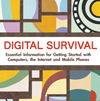- The Computer
- The Internet
- The Mobile Phone
Web-browsing security
 Many countries have installed software to prevent people from accessing certain websites and internet services. Companies, schools and public libraries often use similar software to prevent employees, students and patrons from accessing material that they consider distracting or harmful. Some filters block sites based on their IP addresses, while others blacklist certain domain names, or search through all unencrypted internet communication, looking for specific keywords. If you suspect that the page you are looking for is being censored, you may want to consider using an anonymity tool like Tor (www.torproject.org). You can learn more about bypassing censorship in Security in a Box (http://security.ngoinabox.org/en/chapter-8)
Many countries have installed software to prevent people from accessing certain websites and internet services. Companies, schools and public libraries often use similar software to prevent employees, students and patrons from accessing material that they consider distracting or harmful. Some filters block sites based on their IP addresses, while others blacklist certain domain names, or search through all unencrypted internet communication, looking for specific keywords. If you suspect that the page you are looking for is being censored, you may want to consider using an anonymity tool like Tor (www.torproject.org). You can learn more about bypassing censorship in Security in a Box (http://security.ngoinabox.org/en/chapter-8)

